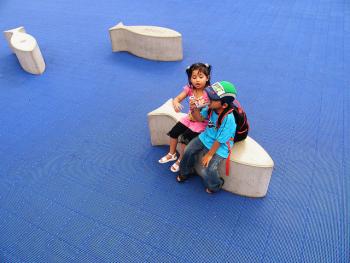Like this article? rabble is reader-supported journalism. Chip in to keep stories like these coming.
Child care has become a key issue in Election 2015. To support the public interest and political debate, the Childcare Resource and Research Unit's blog, Child Care Now, will be published each week between August 12 and October 19. This is the sixth entry in the series. Read the first part here.
There is something quite fascinating about the child-care platforms of the four national parties in this election. For the first time, three of them -- the NDP, Liberals and Green Party -- have child-care platforms that are in fundamental agreement.
Each of the three proposes to actively engage the federal government in child care with the goal of increasing the supply of licensed child care in Canada. There are important differences among the platforms of the three parties, to be sure. But on the broad outlines, they share this fundamental agreement in common.
The three parties are unanimous that the federal government must have a proactive childcare policy that seeks to affect the supply of child care. The NDP has proposed a five-year plan to build or maintain 1,000,000 new funded spaces at a maximum cost of $15/day. The Greens have proposed a universal child-care program though the reinstatement of the 2005 bilateral agreements with a goal of at least 70 per cent coverage. The Liberals have said that within 100 days of forming government, they would call a meeting to begin work in partnership with provinces, territories and Indigenous people to develop a National Early Learning and Childcare Framework.
All have also proposed additional related family policy measures. The Liberals have put forward a new Canada Child Benefit and improvements to parental leave; the NDP has proposed improvements to maternity and parental leave, while the Greens reflect on the value of more "family time."
In contrast, the Conservatives are adamantly opposed to any effort to directly affect the number of spaces (the supply side). Instead, they would continue their policy of directing funds to all parents (the demand side), whether or not they have out-of-pocket child-care costs. Presumably, parents who do have child-care expenses can use the UCCB and related tax measures to offset some of the costs of child care. Parents of teenagers and those who don't have child-care costs can pocket the expanded UCCB to do with as they will.
While the final costing of the four plans is not yet entirely in, the total cost isn't the main point of dispute. The Conservatives, between their UCCB and the Child Care Expense Deduction (but excluding the cost of income-splitting) are planning to spend $7.6 billion in 2014-2015. The NDP plan will cost $5 billion/year by 2023, once the one million funded spots are fully rolled out. The Liberals will announce details of their proposed spending next week but have said that child care will be a part of a 10 year, $20 billion Social Infrastructure Fund that also includes housing and seniors. The Green plan is estimated at $1 billion/year for five years.
Thus, the national parties are not in fundamental disagreement over the bottom line. There is profound disagreement, however, on how those funds should be spent. While the Conservatives have made it clear they will never directly address the shortage of child-care spaces (and hopefully will address this through development of a real plan/a framework/FPT agreements), the NDP, Liberals and Green parties have each proposed ways to do just that.
Happily, this means voters who want their federal government to step up on child care now have real choices on October 19th.
Susan Prentice is a professor of Sociology at the University of Manitoba and a long-time researcher on child care policy
Want to see an election campaign fact rich and spin poor? Chip in to keep our fact check blog up to date.
Image: Flickr/Emran Kassim




Comments
Do
Don't